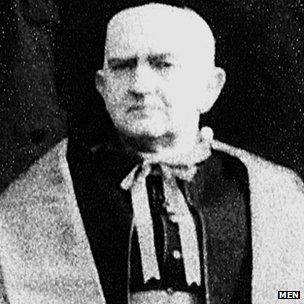Lawyers seek US-style damages for abuse at public schools
- Published

Monsignor Duggan was one of the priests at the centre of abuse claims at St Bede's
A firm of top international lawyers says it intends seeking huge damages from British public schools where former pupils have suffered serious sexual abuse by teachers.
The British-American law firm AO Advocates has told the BBC it wants to see US-style compensation payments, suggesting some UK victims could be in line to receive awards of more than £1 million.
In the last few years, former teachers at scores of private schools, including elite institutions such as Wellington College and Ampleforth, have been convicted of sexually abusing pupils, crimes often committed decades ago.
A representative of the Independent Schools Council has said that it would be "very unfair" and a "great shame" if good schools were forced to close because of compensation payments relating to historical abuse.
"Traditionally people have been getting £30-50,000 damages in a child abuse case," says Georgina Calvert-Lee, a senior barrister at AO Advocates. "We are looking at making 10 even 20 times that - even up to a million pounds."
The lawyers say they will seek similar compensation for adults who have suffered long-term damage from sexual abuse to that seen in clinical negligence and discrimination cases.
"In the United States, if I was to represent a case of this kind, I could get a million pounds," says Ann Olivarius, the American-born founder of the legal practice. "We think there is some wisdom on the other side of the Atlantic about how to handle child protection cases."
One of the company's clients, Rick Merrin, was repeatedly and severely abused by three priests at St Bede's College, a Catholic boarding school in Manchester during the fifties and sixties.
"Nothing can make up for what happened to me at school and the impact I do believe it has had on my life," Mr Merrin says. "There's more at stake for me here than money. I want these three priests to get their comeuppance in the sense that their personal reputations are put where they should be. That would please me greatly."
When he started at St Bede's, Mr Merrin was top of the class, but a psychiatric report, commissioned by his lawyers, concludes his abusers stole the golden future he should have had.
Rick Merrin: "Nothing can make up for what happened to me at school"
"If I look at what I should have achieved in terms of prestige or in terms of money, I can see lots and lots of failure," Mr Merrin accepts. "When you ask if that is down to what happened at school, I can say I think it was."
The lawyers are now preparing a civil action in which they argue his school should fully compensate him for the consequences of the abuse he suffered.
"Through the existing legal structures now you can argue for loss of income, the income you never had a shot at getting because you could never keep your life together," explains Ann Olivarius.
The three priests who abused Mr Merrin, including the former headmaster of St Bede's, Monsignor Thomas Duggan, are all dead. However, following allegations from other pupils of historical abuse at the school, the Bishop of Salford issued an apology "for the pain and distress reported to have been suffered".
Even though they weren't involved and did not have anything to do with the school at the time, seven governors at St Bede's recently resigned because of the possibility of personally facing damages claims in abuse cases.
In 2011, another St Bede's teacher, Father William Green, admitted 27 sexual assaults on boys in the 1970s. Jailing him, the judge said the lives of some of his victims were still affected by the devastation and ruination the priest had left in his wake.
Last November, inspectors rated St Bede's child protection policies 'unsatisfactory' and the college - now a co-educational Catholic day school - has promised to review its safeguarding policies, while insisting St Bede's is "a safe and secure environment".
In a statement, St Bede's points out that the historical abuse took place when the Catholic Diocese of Salford "was responsible for the school". The Diocese has said that until 1976 St Bede's was a direct grant grammar school with a governing body that included lay members and local authority nominees as well as priests.
The chairman of the Independent Schools Council, Barnaby Lenon, believes there has been a huge change in attitudes towards the sexual abuse of pupils within public schools.
"In the 70s and 80s, the words 'child protection' were never really used," he admits. "There has been, in my lifetime, a complete change of culture. These issues are now taken with the seriousness that they deserve."
Mr Lenon says it would be a "great shame" if some of Britain's oldest and most established educational institutions were forced out of business because of huge payments for damages.
"I think it would be very unfair on the teachers, on parents and the children themselves if a good school has to close because of something that happened decades ago," he says.
Ann Olivarius, however, is unapologetic about the possible consequences for institutions of US-style compensation pay-outs.
"It's an issue that we are facing in the US when we bring cases there, but somehow it gets resolved and ways are found to solve the problem," she argues. "If people don't pay real money to stop this problem, the problem is not going to end."
The prospect of American-style civil pay-outs toppling some of Britain's ancient educational institutions will outrage some. Others will protest that only by demanding significant compensation can society properly value the life of a child.